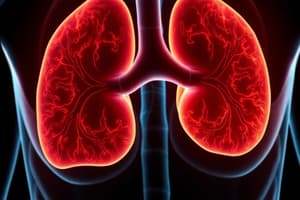Podcast
Questions and Answers
What hormone levels are typically associated with Cushing’s Syndrome?
What hormone levels are typically associated with Cushing’s Syndrome?
- High cortisol, low ACTH, low CRH (correct)
- Low cortisol, low ACTH, high CRH
- Normal cortisol, high ACTH, low CRH
- Low cortisol, high ACTH, high CRH
What causes Cushing’s Disease?
What causes Cushing’s Disease?
- Adrenal tumor producing excess cortisol
- Pituitary tumor that overproduces ACTH (correct)
- Autoimmune destruction of adrenal glands
- Excessive stimulation of zona glomerulosa
In Primary Adrenal Insufficiency (Addison’s Disease), which hormone levels are elevated?
In Primary Adrenal Insufficiency (Addison’s Disease), which hormone levels are elevated?
- High ACTH and low CRH
- Low cortisol and high ACTH (correct)
- High cortisol and high aldosterone
- Normal cortisol and high renin
What is the primary reason for low ACTH levels in Secondary Adrenal Insufficiency?
What is the primary reason for low ACTH levels in Secondary Adrenal Insufficiency?
What characterizes Primary Hyperaldosteronism (Conn’s Syndrome) in terms of hormone levels?
What characterizes Primary Hyperaldosteronism (Conn’s Syndrome) in terms of hormone levels?
What is the underlying cause of Secondary Hyperaldosteronism?
What is the underlying cause of Secondary Hyperaldosteronism?
Which condition is characterized by elevated prolactin levels and causes symptoms like galactorrhea?
Which condition is characterized by elevated prolactin levels and causes symptoms like galactorrhea?
In patients with Secondary Adrenal Insufficiency, which hormone level might be considered normal?
In patients with Secondary Adrenal Insufficiency, which hormone level might be considered normal?
What is a common characteristic of hormone levels in Cushing’s Syndrome compared to Cushing’s Disease?
What is a common characteristic of hormone levels in Cushing’s Syndrome compared to Cushing’s Disease?
Study Notes
Cushing’s Syndrome
- Caused by an adrenal tumor that produces excess cortisol
- High cortisol, low ACTH, and low CRH due to negative feedback
Cushing’s Disease
- Caused by a pituitary tumor that overproduces ACTH
- High ACTH, high cortisol, low CRH (from cortisol’s negative feedback)
Primary Adrenal Insufficiency (Addison’s Disease)
- Often caused by autoimmune destruction of the adrenal glands
- Leads to insufficient production of cortisol and aldosterone
- Low cortisol, low aldosterone, high ACTH, high CRH
Secondary Adrenal Insufficiency
- Caused by pituitary dysfunction leading to low ACTH production
- Low ACTH, low cortisol, normal aldosterone (regulated by RAAS), possibly low or normal CRH
Primary Hyperaldosteronism (Conn’s Syndrome)
- Caused by either bilateral adrenal hyperplasia (BAH) or aldosterone-producing adenoma (APA)
- Leads to excess aldosterone
- High aldosterone, normal cortisol, low renin (due to feedback)
Secondary Hyperaldosteronism
- Caused by excessive stimulation of the zona glomerulosa by high renin, often due to conditions like heart failure or renal artery stenosis
- High aldosterone and high renin
Hyperprolactinemia
- Caused by a pituitary tumor that produces excess prolactin
- Can cause galactorrhea, amenorrhea in women, and decreased libido in men
Studying That Suits You
Use AI to generate personalized quizzes and flashcards to suit your learning preferences.
Description
This quiz covers key concepts related to adrenal disorders, including Cushing’s Syndrome, Cushing’s Disease, Addison’s Disease, and other related conditions. Test your understanding of hormone regulation and the impact of adrenal dysfunction on the body's physiology.



